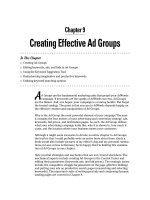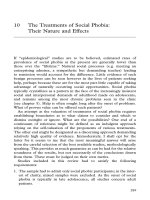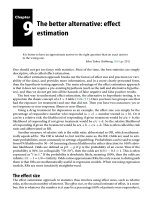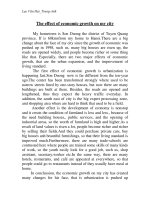capras effect
Bạn đang xem bản rút gọn của tài liệu. Xem và tải ngay bản đầy đủ của tài liệu tại đây (35.03 KB, 2 trang )
The Great Depression was a period of lowered economic activity and extensive unemployment. In
general, times were hard and most people lived in a state of hopelessness. There was a
much-needed entertainment that arose during this time, and that was the work of Frank Capra. His
dream of goodwill was expressed through his memorable works and was uplifting to the people of
this era. It balanced this time period that was so consumed with despair, with laughter and
optimism. Capra once said that the purpose of filmmaking was, "First to exalt the worth of the
individual. Second, to champion man. And third to dramatize the viability of the individual." His
films displayed patriotism and celebrated all-American values. These standards are completely
evident in Capra's film "Mr. Smith Goes to Washington".
<Tab/>Jefferson Smith is just an average guy pulled into something that he is not quite sure
that he can do. When a former senator dies and he is asked to serve the remaining time in his
place, Smith finds out about dirty politics. He gets rather bored of just going along with the
everyday schedule of being a senator. He is the kind of politican that the public admires. Since he
does not really understand the procesess going on around him, he decides to work on his little
project. He has the wonderful idea of forming a boys camp, and he plans on buying a piece of
property through the contributions of others. Unbeknowst to him, some crooked senators are
already after this property to make money for themselves. Mr. Smith makes his debut of his little
project and many of the senators are visably upset. Later he is confronted by them and learns of
their wayward plans. When he refuses to back down and go along with the crowd, the senators
decide to attack him in the most vulnerable ways. When Mr. Smith yields the floor his partner
senator, he bashes Mr. Smith and accuses him of taking the people's contributions for himself.
With this false information the Senate must do an investigation. After long hours of trial, they
come to the conclusion that Mr. Smith is guilty, although in reality he has never compromised his
beliefs or done anything wrong. When they begin to formally charge him, Mr. Smith decides to
fight for the ideals of American Democracy right there. "Mr. President, I stand guilty as framed
because section 40 is graft!" Mr. Smith refuses to yield the floor and speaks for over twenty-three
hours. When it becomes apparent to him that he is just fighting a "lost cause", he collapses.
Senator Paine runs from the room with shame and tries to kill himself. In the end, he confesses
that everything was a setup and that Mr. Smith is truly a good man with the right intentions. "Mr.
Smith Goes to Washington" demonstrates how large and scandalous bureaucratic machines ran
poitics in the early 1900's.
<Tab/>Though it would not be fair to say that the Great Depression was caused by
scandalous bureaucratic machines, it is fair to say that politics played a huge role in this event in
our country's history. As we see in "Mr. Smith Goes to Washington", many of the politicians in
this era had selfish intentions and were in fact very wrong in their way of doing things. I think that
the most important thing to look at is the idea that this movie inspired people in a time of total
helplessness. Although most people had no control over the Depression or the effect that it had on
their jobs or family life, they did have control over their character during this time period. Mr.
Smith is our knight in shining armor; our hero who displays commitment and sacrifice. He was
basically up against a brick wall and had no place to go and no way of defending himself against
the bullies of the Senate. Still he held fast and did not compromise his morales. He fought for his
rights and the rights of those that he represented, and displayed dignity in a situation where no
others did that.
<Tab/>The strongest link that I can see between the Great Depression and "Mr. Smith Goes
to Washington", is the challenge faced by the individuals involved. Times were hard for the
people who lived during the Great Depression. Challenging would not begin to describe the era
that these peole had to live through. In the same way, Mr. Smith had to fight his way through dirty
politics and sacrifice to make things happen. Even when he put all of his effort into a good thing it
backfired and cost him a lot momentarily. It was very difficult for him to stand up for himself
when he faced so much opposition. He could have went back on everything that he believed in,
and guranteed himself a seat in the Senate for many years. Mr. Smith realized that if he allowed
the scandalous senators to turn him into their personal puppet that he would not be accomplishing
anything by being a senator in the first place. In the end "little David" slew the giant. The only
difference was that this time the giant was the corrupted world of politics. Because Mr. Smith
chose not to back down, he made a differnce in his environment and in his world. I think that this
was the message that Capra was tring to send out. His ideals of integrity and dignity were
displayed through his character Mr. Smith. Capra once said,"I thought that drama was when the
actors cried. But drama is when the audience cries." In his own way he did exactly that. He caused
a generation to see the big picture of things in a time when most people could not see past all the
bad happening around them.
If I would have had more time when writing this essay then I would have put a better ending on it.









